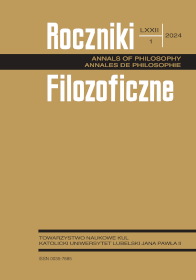The Place of Naïve Realism in Russell’s Changing Accounts of Perception
The Place of Naïve Realism in Russell’s Changing Accounts of Perception
Author(s): Leopold StubenbergSubject(s): Philosophy, Epistemology
Published by: Towarzystwo Naukowe KUL & Katolicki Uniwersytet Lubelski Jana Pawła II
Keywords: Russell; perception; naive realism
Summary/Abstract: In this paper I describe the place of naive realism in Russell’s changing accounts of perception. I argue for the following conclusions: (1) The early period, 1898-1910: I am inclined to think that the naïve realism that Russell embraced so enthusiastically early on may not have been intended as a naïve realism about perception, but as a metaphysical or semantical thesis. (2) The Problems of Philosophy (1912): Russell abandons naïve realism (if, in fact, he ever held it) and presents a sense-datum version of representative realism. (3) “On Matter” (1912): here we see Russell’s best attempt to defend something very close to the standard doctrine of naïve realism. The objects of perception—the “everyday material objects such as caterpillars and Cadillacs”—have, of course, undergone severe reconstruction. But the resulting picture does capture the spirit of the doctrine. (4) The period from 1914 to 1927: though Russell’s thinking about perception underwent some significant changes during this period—the sense datum theory is replaced by neutral monism—I try to show that the distinction between the matter of physics and the thing of common sense is a constant feature of Russell’s changing views. And I suggest that our perceptual relation the thing of common sense (as logically reconstructed by Russell) can usefully be viewed as a limited sort of naïve realism. (5) The period after 1927: the thing of common sense no longer features in Russell’s account of our perceptual access to the world. The things we perceive are percepts, located in our private spaces. The only material objects of which these percepts are parts are our brains. All other material objects are beyond our perceptual reach and are accessible only via inference. This is the end of anything resembling the traditional view of naïve realism in Russell’s account of perception.
Journal: Roczniki Filozoficzne
- Issue Year: 72/2024
- Issue No: 1
- Page Range: 15-41
- Page Count: 27
- Language: English

